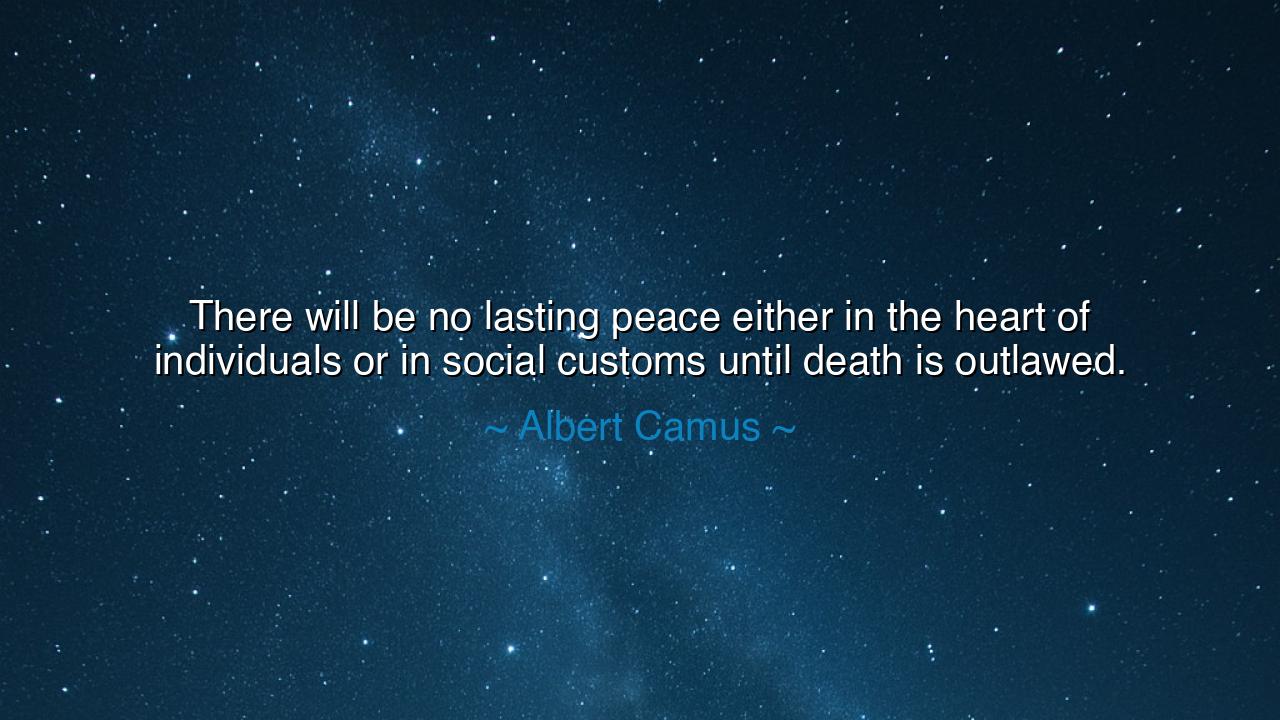
There will be no lasting peace either in the heart of individuals
There will be no lasting peace either in the heart of individuals or in social customs until death is outlawed.






In the haunting and immortal words of Albert Camus, philosopher of the absurd and witness to the despair of the twentieth century, we find this piercing truth: “There will be no lasting peace either in the heart of individuals or in social customs until death is outlawed.” These words, drawn from the depths of his meditations on human suffering, are not the fantasies of a man defying nature, but the lament of one who has seen how the shadow of death governs every corner of life. For Camus, it is not death itself that torments humanity, but the way our awareness of it shapes our fears, our ambitions, and even our cruelty. As long as men live beneath its dominion, both within and without, peace will remain an exile.
Born amid the dust and sunlight of Algeria, Camus lived through a century of war, plague, and despair. He saw nations rise and fall, men kill in the name of order, and societies that worshiped life yet dealt daily in death. From the trenches of two world wars to the cold cruelty of political ideology, he saw that violence was never far from the human heart. When he spoke of “outlawing death,” he did not mean a literal banishment of mortality—for such a dream is beyond even philosophy—but rather the moral and spiritual overthrow of the systems and instincts that glorify it. To “outlaw death” is to reject every power, custom, or thought that feeds upon destruction.
In his masterpiece The Myth of Sisyphus, Camus describes man’s confrontation with the absurd: the endless striving for meaning in a universe that offers none. Yet even in that bleakness, he does not despair. Instead, he calls upon humanity to revolt—to live fully, to love deeply, and to create passionately in spite of the certainty of death. The quote before us extends this same rebellion to the collective spirit: he dreams of a world where men no longer accept killing as natural, where nations no longer build peace upon the graves of the fallen, and where the individual heart no longer makes a silent truce with despair.
There is an ancient echo in his words, for the great minds of old also wrestled with death and its tyranny. The Stoics taught that peace came from accepting mortality; the Epicureans sought to make it meaningless. But Camus stood apart—he neither embraced nor denied it. Instead, he looked at the modern world, drenched in blood, and declared that until humanity learns to treat life as sacred, until the habit of death is broken from our laws and our hearts, we shall know no enduring peace. He saw that societies justify murder in the name of justice, and individuals numb themselves with distraction in the face of mortality. In both, he discerned the same sickness: an acceptance of death as the ultimate master.
Consider the story of Sophie Scholl, the young German student who, during the Second World War, distributed leaflets denouncing the Nazi regime. She was captured and executed at twenty-one. Yet, as she faced her executioner, she said with radiant calm, “Such a fine, sunny day, and I have to go.” Her words, like Camus’s, expose the paradox of the human spirit: that even in the presence of death, there can be dignity, truth, and defiance. Scholl did not “outlaw death” with laws or swords—she did so by refusing to let fear of it corrupt her soul. In this sense, to “outlaw death” is to strip it of its power to govern our conscience and conduct.
Camus’s insight reaches further still. He reminds us that peace begins not in treaties, but in hearts that no longer worship violence or surrender to despair. A society obsessed with death—whether through war, punishment, or exploitation—cannot know harmony. Only when humanity learns to revere life without reserve, to create without destruction, and to build without fear of loss, will the heart of man and the customs of society be truly healed. The outlawing of death, then, is not the fantasy of immortality—it is the moral revolution that places reverence for life at the center of existence.
So, O listener, let this be your meditation: to live as though life were sacred and fleeting, and to make peace the law of your inner world. Refuse the false comfort of cynicism that says death must rule. Refuse the voices that glorify violence as strength. Nurture life wherever you find it—in the soil, in the soul, in the stranger’s eyes. For each act of compassion, each refusal to hate, each honest breath of courage is a quiet rebellion against the rule of death.
And remember, as Albert Camus teaches, the true outlawing of death begins not in heaven, nor in law, but in the heart that chooses life—again and again, despite the shadow that follows it. When enough hearts do this, when enough souls rise in revolt against despair, then perhaps at last there will be peace—not as a dream, but as the living reality of humankind redeemed.






AAdministratorAdministrator
Welcome, honored guests. Please leave a comment, we will respond soon